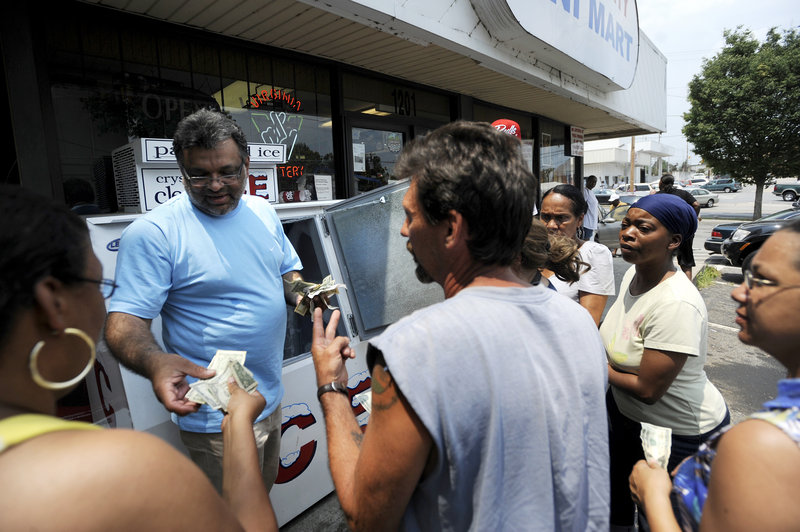FRANCONIA, Va. – A day after seeking refuge at shopping malls and movie theaters, hoping the lights would be back on when they returned, nearly 2.7 million residents faced a grim reality Sunday: stifling homes, spoiled food and a looming commute filled with knocked-out stoplights.
Two days after storms slammed the mid-Atlantic region, power outages were forcing people to get creative to stay cool in dangerously hot weather. Temperatures approached 100 degrees in many storm-stricken areas, and utility officials said the power will likely be out for several more days.
“If we don’t get power tonight, we’ll have to throw everything away,” Susan Fritz, a mother of three, said of her refrigerator and freezer. Fritz came to a library in Bethesda, Md., so her son could do school work. She charged her phone and iPad at her local gym.
The severe weather that began Friday was blamed for 17 deaths, most from trees falling on homes and cars. Three people were killed Sunday in eastern North Carolina when sudden storms hit there. Meanwhile, Coast Guard officials say they have suspended the search for a man who vanished early Saturday while boating during the storm off Maryland.
On Sunday night, federal and state officials in the mid-Atlantic region gave many workers the option of staying home today to ease congestion on the roads.
Federal agencies will be open in Washington, but non-emergency employees have the option of taking leave or working from home. Maryland’s governor also gave state workers wide leeway for staying out of the office.
The bulk of the damage was in West Virginia, Washington and the capital’s Virginia and Maryland suburbs.
• On Sunday night in North Carolina, a 77-year-old man was killed when strong winds collapsed a Pitt County barn where he was parking an all-terrain vehicle, authorities said.
• In neighboring Beaufort County, a couple was killed when a tree fell on the golf cart they were driving. Officials said trees fell onto dozens of houses, and two hangars were destroyed at an airport in Beaufort County. The damage was mostly blamed on straight-line winds.
From Atlanta to Baltimore, temperatures approached or exceeded triple digits. Atlanta set a record with a high of 105 degrees, while the temperature hit 99 at Ronald Reagan Washington National Airport just outside the nation’s capital.
With no air conditioning, officials urged residents to check on their elderly relatives and neighbors. It was tough to find a free pump at gas stations that did have power, and lines of cars snaked around fast-food drive-thrus.
States worked to make sure the power stayed on at water treatment plants so that people at least had clean water. Chain-saws buzzed throughout neighborhoods as utility crews scrambled to untangle downed trees and power lines. Neighbors banded together.
“Food, ice — we’re all sharing,” said 51-year-old Elizabeth Knight, who lives in the blue-collar Richmond suburb of Lakeside.
The Friday evening storms, a meteorological phenomenon known as a derecho, moved quickly across the region with little warning.
The straight-line winds were just as destructive as any hurricane — but when a tropical system strikes, officials usually have several days to get extra personnel in place. Not so this time.
“Unlike a polite hurricane that gives you three days of warning, this storm gave us all the impact of a hurricane without any of the warning,” Maryland Gov. Martin O’Malley said Sunday on CNN’s “State of the Union.”
Send questions/comments to the editors.



Success. Please wait for the page to reload. If the page does not reload within 5 seconds, please refresh the page.
Enter your email and password to access comments.
Hi, to comment on stories you must . This profile is in addition to your subscription and website login.
Already have a commenting profile? .
Invalid username/password.
Please check your email to confirm and complete your registration.
Only subscribers are eligible to post comments. Please subscribe or login first for digital access. Here’s why.
Use the form below to reset your password. When you've submitted your account email, we will send an email with a reset code.